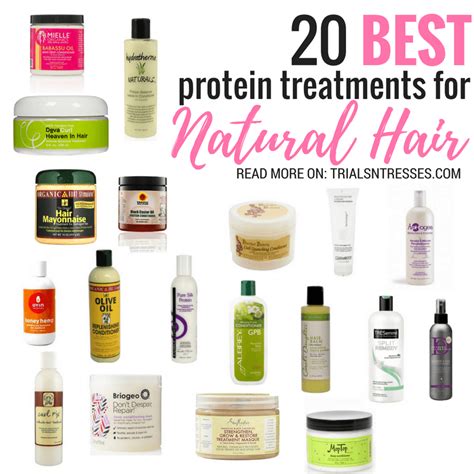Indulge in the transformative power of nature’s proteins and restore your hair to its lustrous, healthy glory. Embark on a journey of hair nourishment with our comprehensive guide to 30 Effective Natural Protein Treatments.

Understanding Hair’s Protein Needs
Hair is composed of a protein called keratin. When this protein is damaged, it leads to weakness, breakage, and dullness. Regular protein treatments can strengthen and repair hair, making it more resilient and vibrant.
30 Natural Protein Treatments for Luscious Hair
1. Egg Mask: Rich in proteins, eggs provide intense nourishment, leaving hair softer and stronger.
2. Yogurt Mask: Contain lactic acid, which helps seal in moisture and prevent protein loss.
3. Gelatin Treatment: Gelatin’s high amino acid content helps restore hair structure and reduce breakage.
4. Avocado Mask: Avocados are packed with essential fatty acids and vitamins that nourish and hydrate hair.
5. Almond Milk Rinse: Almond milk is a gentle protein source that detangles and adds shine without weighing hair down.
6. Chickpea Flour Mask: Chickpea flour is rich in protein and zinc, promoting growth and strengthening hair.
7. Quinoa Mask: Quinoa is a plant-based protein source that repairs damaged hair and boosts volume.
8. Black Bean Mask: Black beans are a good source of protein and fiber, providing nourishment and preventing hair loss.
9. Rice Water Rinse: Rice water is rich in amino acids and antioxidants, promoting hair growth and preventing breakage.
10. Potato Juice Rinse: Potato juice contains a unique enzyme that helps strengthen hair follicles and reduce thinning.
11. Banana Mask: Bananas are rich in potassium and vitamins, providing hydration and preventing hair breakage.
12. Honey Mask: Honey is a natural humectant that locks in moisture, preventing dryness and restoring hair’s elasticity.
13. Olive Oil Mask: Olive oil is rich in antioxidants and fatty acids, nourishing hair and preventing damage.
14. Coconut Milk Mask: Coconut milk is a good source of protein and moisture, promoting hair growth and preventing frizz.
15. Argan Oil Mask: Argan oil is rich in vitamin E and antioxidants, protecting hair from damage and improving shine.
16. Shea Butter Mask: Shea butter is a natural emollient that moisturizes hair, preventing dryness and breakage.
17. Mango Mask: Mangos are rich in vitamin C and antioxidants, boosting hair growth and reducing damage.
18. Papaya Mask: Papayas contain enzymes that help remove dead skin cells and promote hair growth.
19. Aloe Vera Mask: Aloe vera is a natural moisturizer that soothes scalp irritation and promotes hair growth.
20. Green Tea Rinse: Green tea is rich in antioxidants and caffeine, stimulating hair growth and preventing hair loss.
21. Rosemary Oil Mask: Rosemary oil helps improve blood circulation in the scalp, promoting hair growth and preventing thinning.
22. Lavender Oil Mask: Lavender oil has calming properties, promoting relaxation and reducing stress-related hair loss.
23. Tea Tree Oil Mask: Tea tree oil has antifungal and antibacterial properties, helping to treat scalp conditions and prevent hair loss.
24. Pumpkin Seed Oil Mask: Pumpkin seed oil is rich in zinc and antioxidants, promoting hair growth and reducing hair loss.
25. Fenugreek Seed Mask: Fenugreek seeds are rich in protein and nicotinic acid, promoting hair growth and preventing breakage.
26. Onion Juice Mask: Onion juice contains sulfur compounds that help improve hair growth and prevent hair loss.
27. Garlic Mask: Garlic is rich in sulfur compounds and antioxidants, promoting hair growth and preventing damage.
28. Neem Mask: Neem leaves have antibacterial and antioxidant properties, helping to treat scalp conditions and promote hair growth.
29. Amla Mask: Amla is rich in vitamin C and antioxidants, promoting hair growth and preventing hair loss.
30. Shikakai Mask: Shikakai is a natural cleanser and conditioner, promoting hair growth and preventing dandruff.
How to Use Natural Protein Treatments
- Choose the treatment that best suits your hair type and needs.
- Apply the treatment to clean, damp hair and focus on the damaged areas.
- Leave the treatment on for the recommended time (usually 30-60 minutes).
- Rinse the treatment thoroughly and style your hair as usual.
Effective Strategies for Treating Hair with Natural Proteins
- Regularity: Apply protein treatments 1-2 times per week for maximum benefits.
- Consistency: Do not skip treatments to maintain hair’s protein levels.
- Customization: Choose treatments based on your hair type (e.g., dry, oily, damaged).
- Avoid Overuse: Excessive protein treatments can make hair brittle and prone to breakage.
- Balance with Moisture: Use moisturizing products alongside protein treatments to prevent dryness.
- Protect from Heat: Heat styling can damage hair. Limit heat exposure and use heat protectants.
Pros and Cons of Natural Protein Treatments
Pros:
- Natural and gentle: Derived from nature, these treatments are safe and non-toxic.
- Strengthening and repairing: Proteins restore hair’s structure, preventing breakage and damage.
- Nourishing: Proteins provide essential nutrients for healthy hair growth.
- Versatile: Suitable for all hair types and conditions.
Cons:
- Can be time-consuming: Some treatments require longer application times.
- May cause dryness: Some treatments can absorb moisture from hair, causing dryness.
- Can weigh hair down: Excessive protein treatments can make hair feel heavy and greasy.
FAQs About Natural Protein Treatments
1. How often should I use protein treatments? 1-2 times per week.
2. Can I leave protein treatments overnight? No, excessive exposure can damage hair.
3. How can I prevent dryness from protein treatments? Use moisturizing products alongside treatments.
4. Can I use protein treatments if my hair is colored? Yes, but avoid treatments with harsh ingredients that can strip color.
5. Can protein treatments stop hair loss? While they can strengthen hair and reduce breakage, they do not directly prevent hair loss.
6. Can I use protein treatments on chemically treated hair? Yes, but avoid treatments with harsh ingredients that can cause further damage.
7. How can I tell if my hair needs protein? Signs include breakage, weakness, and dullness.
8. Where can I find natural protein treatments? Health food stores, online retailers, or make your own with ingredients from your kitchen.
Conclusion
Embrace the power of nature’s proteins to transform your hair into a healthy, vibrant masterpiece. With our extensive list of 30 Effective Natural Protein Treatments, you can restore your hair’s strength, elasticity, and shine. Experiment with different treatments to find what works best for your individual hair needs, and enjoy the transformative results as your hair regains its youthful allure.
Tables
Table 1: Protein Content of Natural Hair Care Ingredients
| Ingredient | Protein Content |
|---|---|
| Egg White | 10% |
| Yogurt | 5% |
| Gelatin | 15% |
| Avocado | 2% |
| Almond Milk | 3% |
Table 2: Benefits of Natural Protein Treatments
| Benefit | How it Works |
|---|---|
| Strengthens Hair | Proteins repair damaged hair structure. |
| Prevents Breakage | Proteins make hair more resilient to damage. |
| Improves Elasticity | Proteins restore hair’s ability to stretch and recoil. |
| Adds Shine | Proteins seal in moisture, making hair look healthier. |
| Promotes Growth | Proteins provide essential nutrients for healthy hair growth. |
Table 3: Hair Types and Suitable Protein Treatments
| Hair Type | Suitable Protein Treatments |
|---|---|
| Dry Hair | Egg mask, avocado mask, yogurt mask |
| Oily Hair | Almond milk rinse, chickpea flour mask, rice water rinse |
| Damaged Hair | Gelatin treatment, quinoa mask, honey mask |
Table 4: Time Required for Protein Treatments
| Treatment | Time |
|---|---|
| Egg Mask | 30 minutes |
| Yogurt Mask | 30 minutes |
| Gelatin Treatment | 1 hour |
| Avocado Mask | 30 minutes |
| Almond Milk Rinse | 5 minutes |
